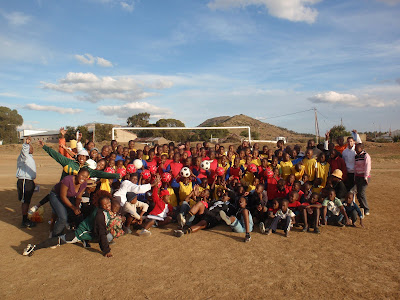Since entering the field of sport for development I have had to confront a number of buzz words. It was the same when I was working as a teacher (critical thinking, higher order thinking, age-appropriate, and multicultural education for example. I have been racking my brain to remember some more, but I think they are leaking out). I think most professions, or fields of work, contain buzz words. They obviously represent concepts which are valued as important, but I think there is also the tendency to hide behind these words. I also feel that they create a form of intellectual laziness. I recently read an article by William Easterly

(He is an economist at NYU. He wrote a book called White Man's Burden: Why the West's Efforts to Aid the Rest Have Done So Much Ill and So Little Good, which has influenced my thinking about international development a great deal). The article references a talk he gave at the London School of Economics about skepticism as a creative force. I don't know if I would classify myself as a skeptic, but I agree with him in the utility of skepticism.
In the sport for development field I always hear or read about life skills, empowerment, self-esteem, and sustainability. I already had a post about life skills on my blog and I recently started writing for the Terry blog at UBC and posted a similar post there.
For this post I am interested in the idea of sustainability in sport for development. It is one of these words that appear on websites and in project proposals, but I am not sure how well thought out it is. Sustainability in international development and sport for development basically refers to the idea that benefits that occur through an intervention should be maintained after the intervention is over.
The problem I have with sustainability is that sports in themselves do not seem sustainable unless the communities, or individuals, believe that there is a positive benefit and are willing to invest without expecting much of a direct return on their investment. Sports programmes require funding for facilities, equipment, and various other needs. In general, youth sports in isolation are not able to generate income. Programmes in Canada receive funding from a variety of sources including: user fees, local sponsorships, government grants, and community fundraising. In Lesotho what is the possibility of a sports programme receiving funding from any of these sources? User fees, local sponsorships, and community fundraising are quite difficult because of the level of poverty. Additionally the idea of government funding for youth sports is also problematic when governments have a hard enough time funding basic health and educational systems.
Many sport-for-development organizations will claim that by partnering with local government organizations and NGOs, and by training members of these organizations that they are ensuring that there work is sustainable. For example:
Right To Play’s approach to programming goes beyond individual capacity-building to include investments in partnerships. By collaborating with, and training dedicated community leaders such as teachers, early childhood educators, and staff from other local implementing NGOs or Community-Based Organizations (CBOs), Right To Play helps to ensure the appropriate localization of programs, the establishment of strong and lasting mentoring relationships, and the long-term sustainability of our work
The idea is that partnering with local organizations and training local people with the skills will ensure the sustainability of the programme. This does create the possibility that skills taught will be sustained and transferred in the future, but it does so with the assumption of continued economic support. This form of sustainability seems to ignore the fact that programmes have to receive funding from somewhere. Until governments, communities, local businesses, or individuals are in a position to prioritize youth sports there is no hope of sustainability.
An additional problem that arises is the possibility that the presence of sport for development organizations actually hurt the long term sustainability of sport. For example, LEFA (the Lesotho National Football Association) receives funding from the government and from FIFA. A portion of this money is supposed to go towards youth development. In Mafeteng there are no youth leagues, very few formal youth teams, and overall very little youth development. Does my presence in Mafeteng motivate the government to provide funds, or does my presence give the government and LEFA an excuse to continue underfunding youth development? If Right to Play is providing the funds and training for physical education teachers in Zambia then what reason does the government have to provide the same service? If an NGO steps in to fill a gap left by government is that NGO doing a good thing, or simply bailing out the government?
May 25, 2010














